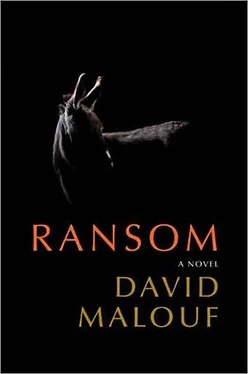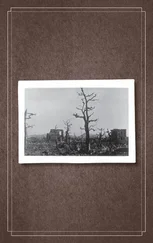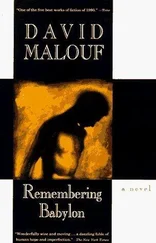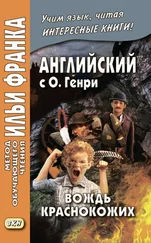‘Alcimus,’ he says, ‘take this good fellow out and see that he is fed. Let him have feed as well for his mules.’
Alcimus steps forward to escort the carter out, and Priam, under the influence of what he has just said, and the quietness with which Achilles has received it, feels emboldened after a moment to go on. ‘Achilles,’ he begins, ‘I appeal to you as a father —’
He pauses, and Achilles, who is prepared for this, stands ready to hear the old man out. But what Priam says now catches him entirely off guard.
‘You are, I know, the father of a son you have not seen for more than half his lifetime. A boy growing up in his grandfather’s house in far-off Scyros. Think what it would mean to you, Achilles, if it was his body that was lying out there, unconsecrated after eleven days and nights in the dust. The body of a son for whom you have a father’s soft affections, to whom you owe sacred duties that nothing, nothing in the world, can cancel. Do you think I ever imagined, when I was a young man as you are now, in the pride and vigour of my youth, that I would in old age come to this? To stand, as I do now, undefended before you, and with no sign about me of my royal dignity, begging you, Achilles — as a father, and as one poor mortal to another — to accept the ransom I bring and give me back the body of my son. Not because these cups and other trifles are a proper equivalent — how could they be? — or for any value you may set upon them. But because it does high honour to both of us to act as our fathers and forefathers have done through all the ages and show that we are men, children of the gods, not ravening beasts. I beg you, ask no more of me. Accept the ransom and let me gather up at last what is left of my son.’ And the old man turns away, unable to go on.
Achilles frowns, sinks into himself. Priam’s evocation of the boy Neoptolemus has touched a sore spot whose ache he has long suppressed.
Nine years ago, when he last saw him, Neoptolemus was a mere child, a sturdy seven-year-old, boisterous and proud, with flamy red-gold hair and a saddle of freckles across his nose; an impish small man with the swagger and gruffness of voice, and a brow stern enough for a veteran of forty, that children of that age, in mimicry of their elders, will assume at times with an almost comic effect.
And now?
He has tried to picture the grown youth of sixteen, hard-bodied and full of manly resolution, already eager to prove himself, already urging his grandfather, Lycomedes, to let him leave his tutors and the exercise of the palaestra and set sail for Troy, and take his place at last at his father’s side as one of his fearsome Myrmidons. But haunted as he is by old affection, it is the swaggering child who leaps into his mind. All Achilles can see when he looks back across those nine years is the small mimic hero, striding up and down in his grandfather’s hall and posturing with his miniature sword and scowl and little-mannish antic bluster.
But Priam has recovered.
‘Achilles,’ he says, his voice steady now, ‘you know, as I do, what we men are. We are mortals, not gods. We die. Death is in our nature. Without that fee paid in advance, the world does not come to us. That is the hard bargain life makes with us — with all of us, every one — and the condition we share. And for that reason, if for no other, we should have pity for one another’s losses. For the sorrows that must come sooner or later to each one of us, in a world we enter only on mortal terms. Think, Achilles. Think of your son, Neoptolemus. Would you not do for him what I am doing here for Hector? Would your father, Peleus, not do the same for you? Strip himself of all the ornaments of power, and with no concern any longer for pride or distinction, do what is most human — come as I do, a plain man white-haired and old, and entreat the killer of his son, with whatever small dignity is left him, to remember his own death, and the death of his father, and do as these things are honourably done among us, to take the ransom I bring and give me back my son.’
In the stillness that follows — for the noise his men are making no longer comes to his ears — Achilles feels immobilised and outside time.
This morning, on the beach beyond the line of Achaean ships, he had stood staring out across the gulf and felt that it was not space his mind was being drawn into, but the vast expanse of time, at once immediate in the instant and boundless, without end.
Now, in the aftermath of Priam’s words, he sees beyond Priam another old man, both closer and further off: his father Peleus, and beyond him another, himself, the old man he will never be. And is struck, in a breath and in all his limbs, by such a coldness as he has never known, even on the deepest winter nights on the Trojan plain. Ice ribs him round with an iron grip. It is the coldness of that distant star that is the body’s isolation in death.
The moment passes, the thick ice cracks. In his return to the heat and noise of the hut his eyes burn so that he has to cover them with his hand. When he looks up again there is, around everything he sees — the old man Priam who stands before him, the mob at the trestle table — a reddish glow, as if his eyeballs were awash with blood. A fireball comes whistling through the air, a fiery-headed agent of such destructiveness as all these nine years of slaughter have not seen. Priam, in evoking his own death, has let in among them the fearsome instrument of it. Achilles feels the breath of a hot sword in the air. Sees, as through a momentary opening in eternity, the old man Priam go sprawling. Hears the armed Fury, in a burning glance across his shoulder, shout into the dark: ‘There, father! There, Achilles! You are avenged.’
Achilles sits soul-struck. It is his son, Neoptolemus.
What he has witnessed, in the illumination of the moment as Priam has called it up, is a time to come, the end of things in the days after his death.
Priam, impelled by the look of annihilating revelation that has struck the man, falls to his knees at last and clasps Achilles’ hands. Not in supplication now, as he had intended, but out of instant fellow-feeling.
So the scene is acted after all.
But Achilles mistakes the gesture for more pleading. With a look of horror he starts back and roughly pushes the old man off.
‘No,’ he shouts, ‘no more!’ and his voice is raw with anguish. ‘Don’t speak again. You will have what you came for.’
He ignores the sob that comes from the old man and rejects the attempt to clasp his knees.
‘No more! Please! When Hector’s body has been washed and prepared, we will eat something together and you can rest. Till then, my attendants will see to you.’ And he offers the man, who seems suddenly too weak to get up without assistance, his hand.
So Achilles, as he has done each morning now for eleven days, goes down to where the body of Hector lies in the dust.
Automedon, torch in hand, goes with him. A groom follows with a folding stool under his arm and a stake with an iron bracket.
It is an hour before midnight. A breeze has cleared the sky of cloud, and the stars, some huge and single, others in shoals or clusters, hang so low that Achilles believes he can smell them, the air out here is so fresh and clean after the smokiness of the hut.
Automedon fixes the torch in its bracket. The groom unfolds the stool, drives its legs into the soft earth, tests it for balance. Achilles nods. Automedon and the groom may leave now. He wants to be alone. But Automedon, who is a worrier, hesitates.
‘No,’ Achilles tells him. ‘Go now. I’ll call when I need you.’
Automedon has no recourse but to obey.
Achilles, alone at last with his thoughts, draws his cloak about him and sits.
At his feet the body of his dead enemy. It shines as with the light of another star, a metallic brightness. Except for the wound at the throat where his sword went in, it is unmarked. The wound is as clean as if it had just been made. After eleven days in the sun the body has neither the discolouration nor the smell of corruption.
Читать дальше












